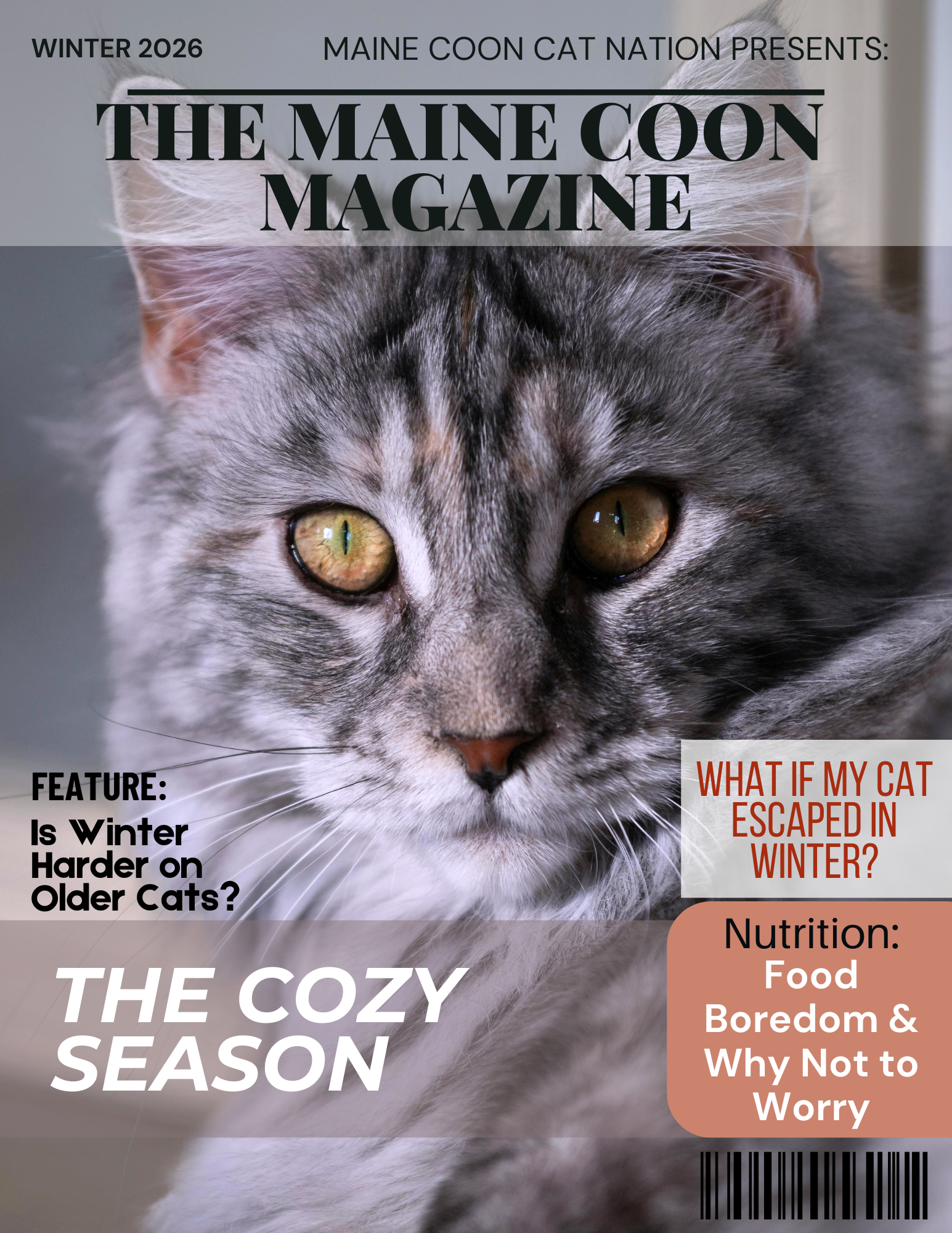- Home
- Maine Coon Kittens
- Why is My Kitten Biting?
Why is My Kitten Biting?
Surviving the Teething Stage
No matter how sweet and docile your new baby is, you will enter the teething phase. This is when many cat parents ask: "why is my kitten biting me?"
If you like this, you'll love our fun, free Daily Digest!

Why is my kitten biting? It's a question many cat owners ask, especially when those adorable kitten nibbles turn into more intense bites.
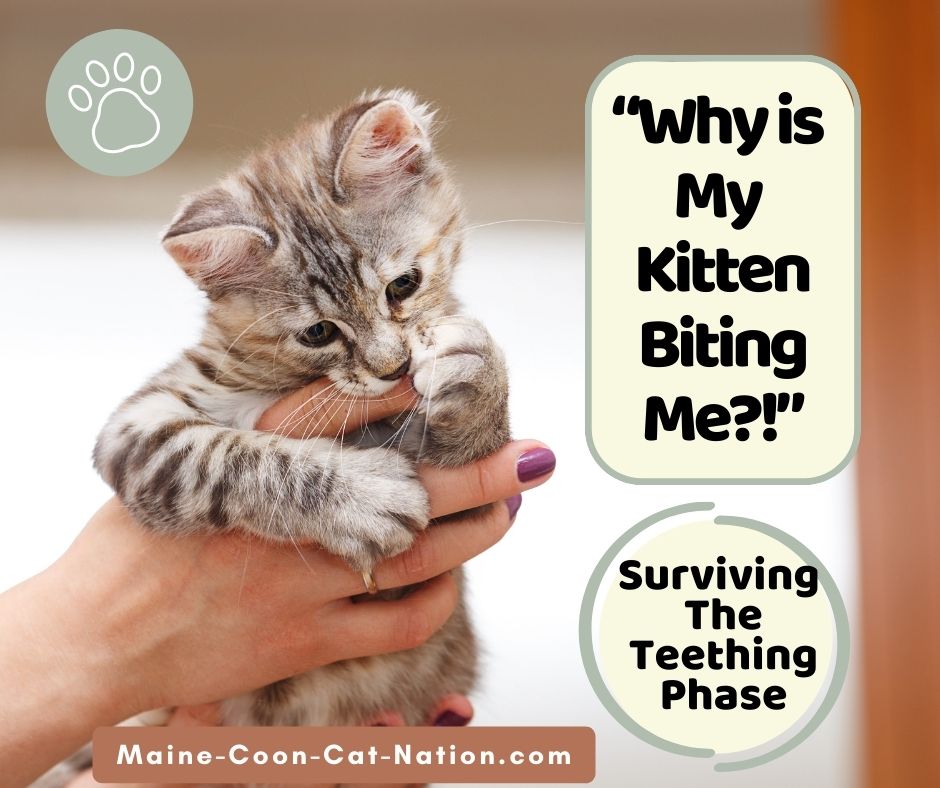
When Alice and Leo were young kittens, I noticed they sometimes got a little rough during play sessions.
Luckily for me, they were gentle and intelligent, so biting was kept to a minimum.
But it did happen from time to time. They'd sneak in those little nibbles during a game or get a bit too excited and nip.
Kittens between three and six months of age often go through a biting phase as their adult teeth come in.
This can lead to play aggression, where rough play turns into uncomfortable bites.
Even love bites, which are usually gentler, can be confusing for cat owners.
I used specific techniques (which I'll share later) to help curb this biting behavior, especially during a play session. Biting isn't always a sign of aggression - sometimes it's just part of growing up.
But cat bites, even from young kittens, can hurt and should be managed before they carry these habits into adulthood.
Properly addressing biting behavior early on ensures that your kitten grows into a well-mannered adult cat.
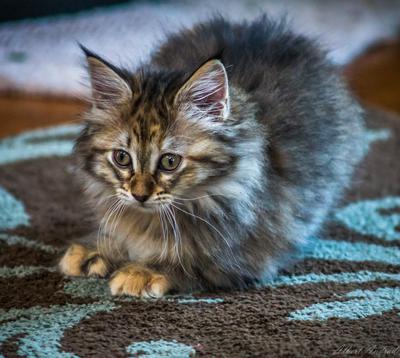
Curbing Naughty Behavior
Maine Coon kittens are full of energy and curiosity. When they're young, they love to test boundaries, and sometimes their playful nature can come across as a bit "naughty."
During their frisky phase, these big cats often find creative ways to get into trouble.
From knocking things over to playfully pouncing on anything that moves, Maine Coon kittens keep you on your toes.
This natural behavior, while adorable, can sometimes lead to biting or scratching, especially during their teething stage.
Teething is a natural part of a kitten's development, and for Maine Coons, it can last several months. Just like human babies, kittens feel discomfort as their teeth come in.
They often try to soothe this discomfort by chewing on anything they can get their paws on, including fingers, furniture, and toys.
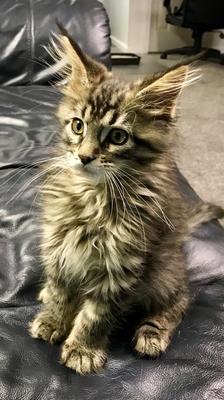
While this might seem harmless at first, it's important to gently discourage biting, even if it's playful.
One way to help your kitten through teething is to provide appropriate toys. Soft chew toys designed for teething kittens can give them something safe to gnaw on.
This can keep them from turning to less appropriate things, like your fingers or furniture.
When it comes to boundary testing, Maine Coons can be quite persistent.
They are highly intelligent and curious, which means they'll often try to figure out what they can get away with.
It’s important to set clear rules from the start, but also remember that patience is key.
Rather than scolding them, try redirecting their energy. Engaging your Maine Coon in play sessions with interactive toys can help burn off some of that extra energy.
Wand toys, laser pointers, and puzzle feeders are great options to keep them mentally and physically stimulated.
Another common behavior with young Maine Coons is their love of pouncing - they are natural hunters, after all!
This can be fun when they're going after a toy, but it’s less amusing when they’re pouncing on your feet or other pets in the house.
The best way to manage this is with positive reinforcement. Reward them with treats or affection when they play nicely.
If they start to get too rough, redirect them to an appropriate toy and ignore the behavior you want to discourage.
Socialization is also important at this stage. Maine Coons, while naturally friendly, still need guidance on how to interact with people and other animals. Introduce them to new experiences in a controlled way.
Exposing them to different sights, sounds, and people will help them grow into well-adjusted adult cats.
If your kitten is particularly rambunctious, consider using puzzle toys that challenge their brains. A tired cat is a well-behaved cat!
Consistency is key when managing a frisky Maine Coon. Make sure everyone in your household follows the same rules when interacting with the kitten.
If one person allows behavior that others do not, your kitten will become confused and more likely to test boundaries.
Over time, with consistent training and patience, your Maine Coon will learn what is acceptable.
Biting, scratching, and boundary-testing are all natural behaviors for a young Maine Coon.
By providing the right toys, setting clear rules, and using positive reinforcement, you can guide your kitten through this phase while keeping their playful spirit alive.
As they mature, you'll find that their behavior evens out, leaving you with a loyal, affectionate companion.
Why is My Kitten Biting Q&A's:
Why is My Kitten Biting?
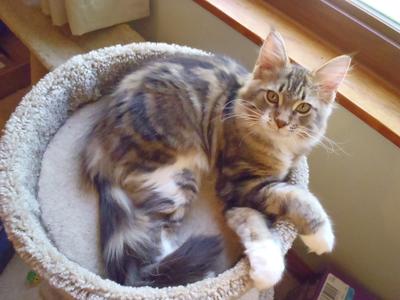
Your furbaby is probably going through the teething stage.
They do this for the same reason human babies do - to relieve teething pain.
Provide lots of toys, don't let them bite people, and they will grow out of it!
At what age do kittens start teething?
At what age do kittens start teething?
Most kittens start teething at around 3-4 months of age. This is when they lose their baby teeth and their adult teeth start coming in.
The teething phase can last until they are 6-7 months old. During this time, you may notice playful biting as they explore their new teeth.
Is biting during teething normal?
Is biting during teething normal?
Yes, it's completely normal! Kitten bites are a natural instinct during teething.
As their adult teeth grow in, their gums become sore, and biting helps relieve the discomfort.
Young cats may bite toys, furniture, or even your hands during this stage.
How can I help soothe my kitten's teething pain?
How can I help soothe my kitten's teething pain?
Provide plenty of toys designed for chewing. Soft rubber toys or ones that can be chilled in the fridge are especially good for sore gums.
These options encourage good behavior and help redirect biting away from inappropriate objects.
Why does my kitten bite me more than toys?
Why does my kitten bite me more than toys?
Kittens sometimes see hands or feet as playthings, especially if they've been allowed to play rough.
Sudden movements during play can trigger their natural instinct to bite. To teach bite inhibition, use toys to redirect their energy and keep your hands out of the game.
Can teething make my kitten stop eating?
Yes, teething can cause mild discomfort that may reduce your kitten's appetite.
If this happens, offer softer food that’s easier to chew. If your kitten refuses to eat for more than a day, consult your vet to ensure there’s no underlying issue.
How can I prevent my kitten from biting furniture or inappropriate items?
Encourage your kitten to chew on safe toys by offering a variety of textures. You can also apply bitter-tasting sprays to furniture to deter them from biting household items.
Providing plenty of toys helps channel their energy into good behavior.
What should I do if my kitten bites me during play?
If your kitten bites during play, immediately stop and withdraw your attention. This teaches them that biting stops the fun.
Be sure to reward them for playing gently to reinforce the behavior you want.
How do I know if my kitten's biting is more than just teething?
If your kitten shows signs of aggressive behavior or continues biting beyond the teething phase, it could signal a behavior issue.
Also, if they avoid eating or seem in pain, consult your vet to rule out dental problems.
It's important to distinguish playful biting from more serious types of biting that require attention.
Can kittens learn not to bite people?
Absolutely. You can expect them to. With patience and consistency, kittens can learn good behavior, including bite inhibition.
Mother cats and littermates often teach young kittens not to bite too hard. You can reinforce this by setting clear boundaries during play.
So, if you do have a "nibbler," not to worry! Kitten biting is a natural part of their development, especially during teething.
With patience, proper redirection, and the right toys, you can guide your kitten toward gentler play and good behavior.
Top of: Why is My Kitten Biting?
« Back to Maine Coon Kittens
